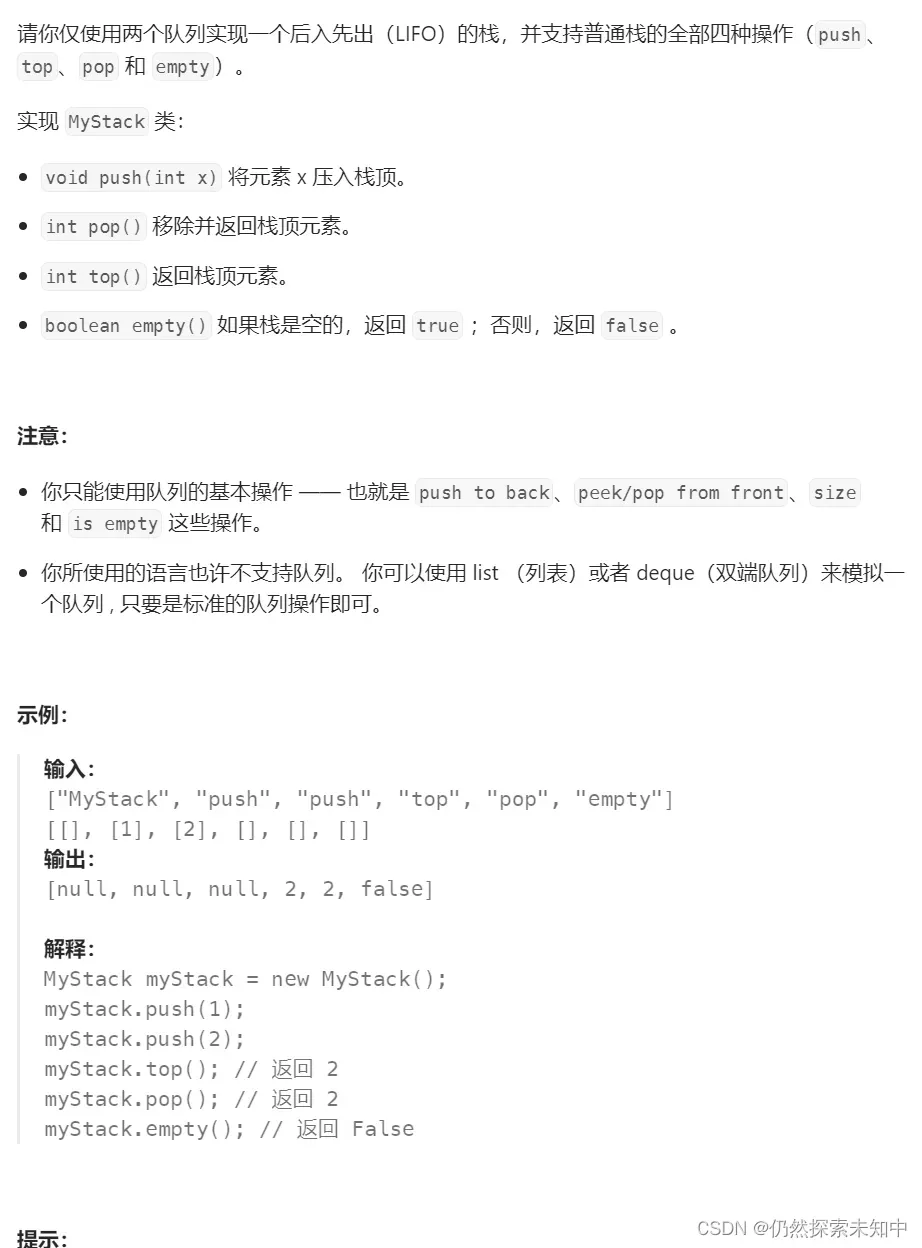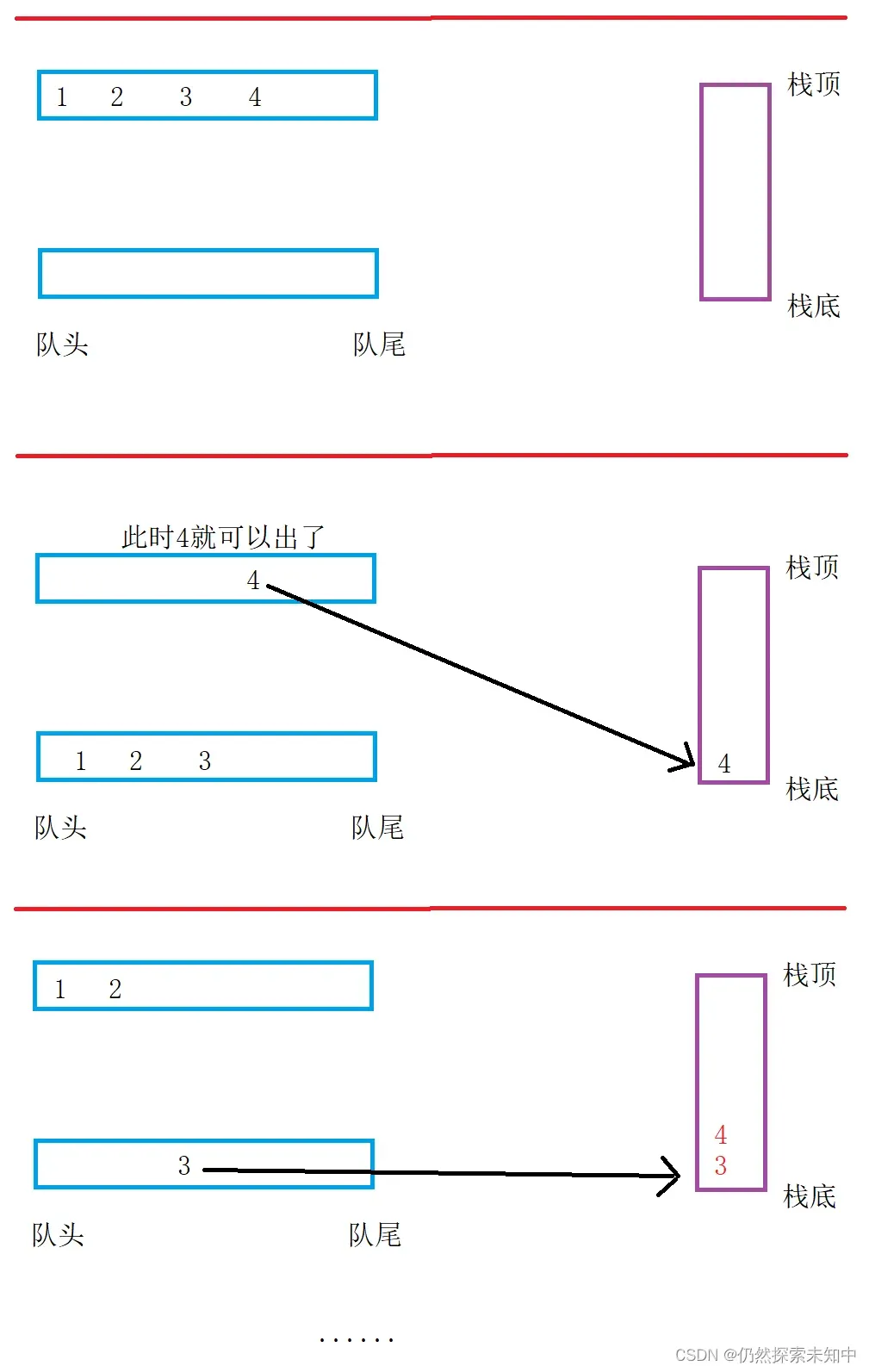LeetCode | 225. 用队列实现栈
OJ链接

-
此题可以用两个队列去实现一个栈,每次始终保持一个队列为空,
入栈操作相当于给非空队列进行入队操作 -
入数据,把不为空的队列入
-
出数据,把不为空的队列数据导入为空,直到最后一个
-
出栈操作相当于非空队列的队尾元素出队,此时需要把非空队列除最后一个元素之外的其余元素入队到空队列,然后出队最后一个队尾元素

代码如下:
#include<stdio.h>
#include<assert.h>
#include<stdlib.h>
#include<stdbool.h>
typedef int QDataType;
typedef struct ListQNode
{
QDataType val;
struct ListQNode* next;
}QNode;
typedef struct Queue
{
QNode* phead;
QNode* ptail;
QDataType size;
}Queue;
// 初始化队列
void QueueInit(Queue* pq);
// 队尾入队列
void QueuePush(Queue* pq, QDataType x);
// 队头出队列
void QueuePop(Queue* pq);
// 获取队列头部元素
QDataType QueueFront(Queue* pq);
// 获取队列队尾元素
QDataType QueueBack(Queue* pq);
// 获取队列中有效元素个数
int QueueSize(Queue* pq);
// 检测队列是否为空,如果为空返回非零结果,如果非空返回0
bool QueueEmpty(Queue* pq);
// 销毁队列
void QueueDestroy(Queue* pq);
void QueueInit(Queue* pq)
{
assert(pq);
pq->phead = pq->ptail = NULL;
pq->size = 0;
}
// 队尾入队列
void QueuePush(Queue* pq, QDataType x)
{
assert(pq);
QNode* newnode = (QNode*)malloc(sizeof(QNode));
if (newnode == NULL)
{
perror("malloc fail\n");
return;
}
newnode->val = x;
newnode->next = NULL;
if (pq->ptail == NULL)
{
pq->phead = pq->ptail = newnode;
}
else
{
pq->ptail->next = newnode;
pq->ptail = newnode;
}
pq->size++;
}
// 队头出队列
void QueuePop(Queue* pq)
{
assert(pq);
assert(pq->phead);
QNode* del = pq->phead;
pq->phead = pq->phead->next;
free(del);
del = NULL;
if (pq->phead == NULL)
pq->ptail = NULL;
pq->size--;
}
// 获取队列头部元素
QDataType QueueFront(Queue* pq)
{
assert(pq);
assert(pq->phead);
return pq->phead->val;
}
// 获取队列队尾元素
QDataType QueueBack(Queue* pq)
{
assert(pq);
assert(pq->ptail);
return pq->ptail->val;
}
// 获取队列中有效元素个数
int QueueSize(Queue* pq)
{
assert(pq);
assert(pq->phead);
return pq->size;
}
// 检测队列是否为空,如果为空返回非零结果,如果非空返回0
bool QueueEmpty(Queue* pq)
{
assert(pq);
return pq->phead == 0;
}
// 销毁队列
void QueueDestroy(Queue* pq)
{
assert(pq);
QNode* cur = pq->phead;
while (cur)
{
QNode* next = cur->next;
free(cur);
cur = NULL;
cur = next;
}
pq->phead = pq->ptail = NULL;
pq->size = 0;
}
typedef struct {
Queue q1;
Queue q2;
} MyStack;
MyStack* myStackCreate() {
MyStack* pst = (MyStack*)malloc(sizeof(MyStack));
QueueInit(&pst->q1);
QueueInit(&pst->q2);
return pst;
}
void myStackPush(MyStack* obj, int x) {
if(!QueueEmpty(&obj->q1))
{
QueuePush(&obj->q1,x);
}
else
{
QueuePush(&obj->q2,x);
}
}
int myStackPop(MyStack* obj) {
Queue* emptyq = &obj->q1;
Queue* noemptyq = &obj->q2;
if(!QueueEmpty(&obj->q1))
{
emptyq = &obj->q2;
noemptyq = &obj->q1;
}
while(QueueSize(noemptyq) > 1)
{
QueuePush(emptyq,QueueFront(noemptyq));
QueuePop(noemptyq);
}
int top = QueueFront(noemptyq);
QueuePop(noemptyq);
return top;
}
int myStackTop(MyStack* obj) {
if(!QueueEmpty(&obj->q1))
{
return QueueBack(&obj->q1);
}
else
{
return QueueBack(&obj->q2);
}
}
bool myStackEmpty(MyStack* obj) {
return QueueEmpty(&obj->q1) && QueueEmpty(&obj->q2);
}
void myStackFree(MyStack* obj) {
QueueDestroy(&obj->q1);
QueueDestroy(&obj->q2);
free(obj);
}
文章出处登录后可见!
已经登录?立即刷新
